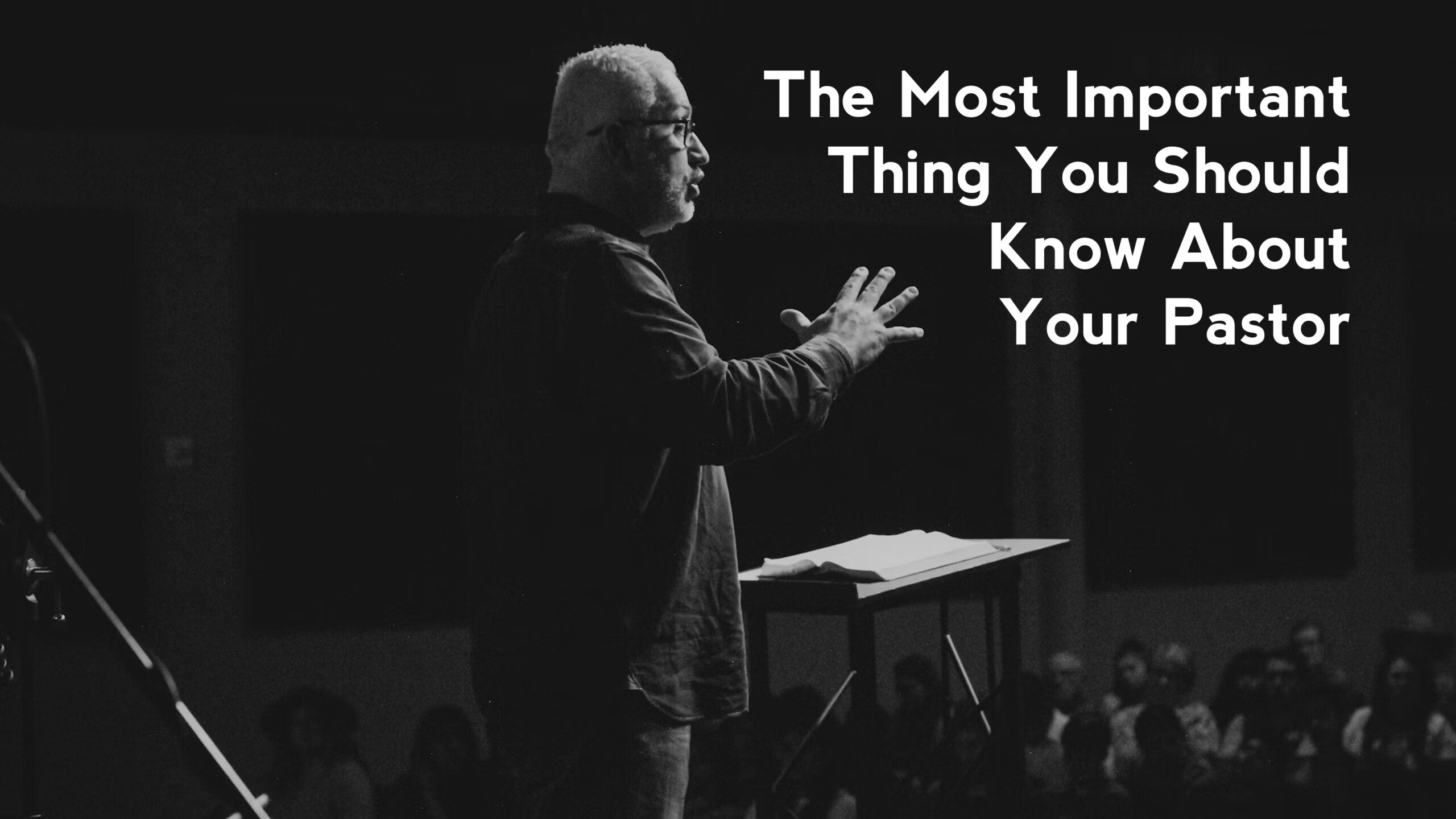I want to preface this by saying that I love my church and I know my church loves me! It is difficult to share important issues like this without someone assuming there’s a problem. Few people know what it’s like to be a pastor, unless they’ve done it. So I want to be clear that I’m writing this from a place of transparency, not a place of resentment. I’m also writing this for all the pastors out there who feel what I’m about to share, but don’t feel safe to say it themselves. In the end, I hope this helps everyone in your churches relate to your pastor better, wherever you call your church home…
I’ve been blessed to be called “Pastor” for nearly 20 years now. I’ve also had the privilege of mentoring a number of other godly men who serve as pastors in other ministries, as well as networking with hundreds who serve around the country and across the globe. If I had to summarize the most important thing I wish people in our churches knew about us, it would be this…
Pastors are people too.
No duh, right? But in my personal experience, and seeing the experiences of so many others in my role, I sincerely believe that most church members and attenders routinely forget this, and it manifests itself in a multitude of ways. From forgetting that your pastor has his own sin and personality, to not realizing that he has feelings and needs also – many people in churches see their pastor as a resource, and little more. To the average church attender’s credit, I sincerely believe this is generally unintentional.
When we often approach our pastors to express our desires, preferences, struggles, frustrations, and needs, it gets easy to forget that our pastors are trying to manage the desires, preferences, struggles, frustrations, and needs of everyone in the church and community they’re trying to reach… not to mention their own desires, preferences, struggles, frustrations, and needs!
Add to this the fact that pastor are almost always unable to share any of these struggles. You can vent about your job on Facebook, but not if you’re a pastor. If a customer or client is hard to work with at your job, you can joke about it afterward with your coworkers or friends, but for a pastor, this would amount to spreading gossip or far worse. So when pastors get hurt – and we often do – the only person they are generally able to share it with, is the only person they are incapable of hiding it from… your pastor’s wife. And yet, that is also not an option many times, for reasons of confidentiality and protecting her well-being. As a result, we tell our wives things like, “I’m hurting over something, but I can’t share it.”
The truth is, most pastors are desperately lonely. Few people in church ever sincerely think to check on a pastors’ emotional, relational, or spiritual well-being until a sin-issue arises with him, which usually results in his dismissal… and he knows this, and wants avoid becoming a casualty. So what do most pastors do? Bottle it up. We seek the Lord, yes. And Jesus is enough for us, just like He is enough for you. But we are people, too. And it gets hard to focus on Jesus, when the only focus many pastors get from people is in the form of criticism.
Let me offer a few helpful things to seeing your pastor as a person whom Jesus radically loves…
- Accept that he isn’t perfect. Knowing he isn’t perfect is one thing, but accepting it is something different entirely. Realize that he is trying to grow in His walk with God just like you, and he is not going to get it right all of the time. When he once again “falls short of the glory of God” (Romans 3:23), choose to extend the same grace to him as you hope he will extend to you in your sin.
- Recognize he lives in a glass bowl. The pastor lives his life on a very public display. We routinely share our lives, flaws, failures, and struggles as we preach because we know that you may admire our strengths, but you relate to our weaknesses. Additionally, our entire families are on display! You know far more about our kids then our kids know about you… this creates a ton of pressure for the pastor, his wife, and their kids.
- Respect healthy boundaries. Pastoring is a 24/7 job. We get calls and emails in the middle of the night, on our days off, and while vacationing with our families, often for non-emergencies. Some people stop us to criticize us right before we’re suppose to stand up and preach God’s Word. And others just assume his availability is entirely open to their own schedule. Some helpful advice, is don’t call/text your pastor after 9pm unless it is an emergency. If you need to talk, ask for an appointment, and tell him what it’s about. If you’re vague, you put him in the position of speculating and fearing the worst.
- Express gratitude more than criticism. You are probably aware of 100 problems in your church, but your pastor is aware of 1,000. The vast majority of which, he is unable to share with you. He has to address roughly a dozen issues a day at a minimum just to keep the ministry moving in the right direction. Choose to be one of the people who honors, thanks, prays for, and expresses love and kindness to your pastor. Even more so, do this for his wife and kids! Some of the best acts of love my church family has ever done for me was blessing my wife and children. It was Tiffany’s birthday just last Sunday, and several people brought my wife cards, gifts, and even flowers. A few months ago, another member in the church discovered my youngest son was really into different rocks and geodes, so he bought him a special microscope for looking at different rocks… it wasn’t even my son’s birthday! Even just a simple word of encouragement, text, or email to say “thanks for all you do” goes much farther than you realize.
- Listen to grow. The best compliment to any sermon is a changed life. Some people only listen to criticize. Others listen because they “like” the preaching, but they don’t intend to do anything with it! God promised that His Word would never return void, but would accomplish His purposes (Isaiah 55:11). Even if your pastor is not the most-brilliant preacher you’ve ever heard, he’s your preacher. If he weekly opens you to the Scriptures and does his best to convey something useful through the Word, take what can be used and choose to be obedient to the Word.
- Embrace the vision. The pastor is called to lead, or literally “oversee” the church (1 Peter 5:1-3) – not just preach to it. And a leader take people somewhere they were not planning to go. If they were planning to go, then they would have done it without the leader, ironically making them the leader. Good pastors do their best to listen to the voice of the Holy Spirit, obey the Word of God, understand their church, and discern their times and community as we lead the church. We have many voices competing to influence our leadership, including within our churches – and they are often contradictory of one another or contradictory of God’s voice. Instead of trying to get your pastor to see things your way, what if you chose to see things his way? What if the whole congregation chose to see things the same way as the man you’ve collectively affirmed as your pastor? What could your church get done for the Kingdom if this was your default attitude, rather than a reluctant last resort?
- Pray for your pastor. Pray for his family. Pray for his marriage. Pray for God to bless him, lead him, and reward him openly for his labor. Pray for his integrity and character. Pray for his boldness and leadership. Pray for his peace. As it goes for your pastor, it will often go for your church. If he struggles, the church struggles. If he falls, the church stumbles. If he wins, the church wins. Pray that God would protect, guide, and bless him as he serves all of you, so that it may also go well for the church.
I know for many of you reading this, you feel a weight of anxiety about trusting your pastor. I also know that in many cases, that comes from a place of church hurt, often because of a “pastor” who loved his authority more than his congregation. But in my experience, those kind are the exception, not the norm. Most pastors are hard-working, deep-loving, God-fearing men who wish to lead well, and draw their communities to Jesus. In my next post, I’ll give a handful of ways you know you got a “good” pastor.
Blessings,
Pastor John




